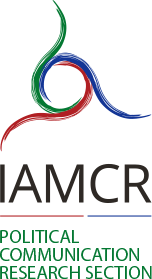
The Political Communication Research Section of the International Association for Media and Communication Research (IAMCR) invites proposals for IAMCR 2023, to be held in Lyon, France, from 9 to 13 July (Lyon23) with an Online Conference Papers (OCP23) component from 26 June to 5 July.
The deadline for submission of proposals is 9 February 2023 at 23h59 UTC.
See the CfPs of all sections and working groups >
Conference themes
IAMCR conferences have a main conference theme that is explored from multiple perspectives throughout the conference in plenaries and other moments, including the programmes of the thematic sections and working groups. Additionally, each section and working group also defines some of its own themes, which are described in their individual calls for proposals. Proposals for contributions to the conference are submitted to the sections and working groups and may focus on an aspect of the main conference theme as it relates to the concerns of the section or working group, or address a theme identified by the section or working group.
Main theme – Inhabiting the planet: Challenges for media, communication and beyond
The main theme for IAMCR 2023, “Inhabiting the planet: Challenges for media, communication and beyond”, is concerned with possibilities for rethinking communication research agendas at a time when the irreversible effects of climate change are compounded by stark geopolitical, sociocultural, and religious tensions in human communities. At this juncture, urgent reflection and research are needed on how we can hope to flourish today and in the future, and also how media and communication tools and environments can be positive forces and spaces for change.
Five sub-themes of this central theme have been identified: Humanity and progress; democracy; media, information, and communication; cities and territories; and environmental accountability.
Consult a detailed description of the main theme and its sub-themes
The communicational challenges that we face as we inhabit the planet will be explored throughout plenary sessions, as well as special sessions led by the sections and working groups. While we welcome submissions that directly address this theme, the focus is not limited to it.
The Political Communication Research section aims at bringing together state-of-the-art scholarship addressing (digitally) mediated communication and its intertwining with political actors, discourses, practices, and publics. Furthermore, the section encourages works that explore the political within cultural and artistic practices.
We invite cutting-edge, original submissions that broaden our theoretical and/or empirical understanding of a range of contemporary debates at the intersections of politics and communication.
The Political Communication Research section is particularly interested in:
- Comparative research projects.
- Works from underrepresented regions and communities.
- Interdisciplinary approaches.
- Innovative methodological approaches.
- Papers that contribute to theory-building.
The range of approaches includes, but is not limited to:
- Communicating global challenges in times of crises
- Elections and political campaigns
- Communicating war, propaganda, and diplomacy
- Authoritarian and illiberal movements across the globe
- Diversifying the field of political communication
- Underrepresented identities and actors in politics
- Disinformation campaigns and truth-making
- Digitally mediated political communication
- The datafication of political communication
- Rethinking populist communication
- Political communication and popular culture
- Political performances and aesthetics
- Protests, digital activism, and advocacy communication
- Polarisation and mediated hate speech
- Communicating effect and emotions
- Audience engagement and political participation
Contributing to the conference: Lyon23 and OCP23
There will be two ways of joining IAMCR2023:
- If you are not able to or don’t want to join the face-to-face conference in Lyon but do want to submit an online-only paper, submit your abstract to OCP23 only. If accepted, you’ll later submit your full paper to the online platform, which will be open for discussion from 26 June to 5 July.
- If you do want to join the face-to-face event, submit your abstract to Lyon23 and OCP23. If accepted you’ll submit your paper to the online platform and present it at the face-to-face conference.
Guidelines for abstracts
Abstracts should be around 500 words and must be submitted online here. Abstracts submitted by email will not be accepted.
The deadline to submit abstracts is 9 February 2022 at 23h59 UTC.
No more than one abstract can be submitted by an author to the Political Communication Research section. Please also note that the same abstract or another version with minor variations in title or content must not be submitted to more than one section or working group. Any such submissions will be deemed to be in breach of the conference guidelines and will be rejected.
Please note that each accepted author must serve as a respondent for another presenter during the conference.
Proposals are accepted for both single papers and panels. Proposals for panels can only be submitted to Lyon23 and OCP23. Panel submissions must include an abstract for each paper submitted here and a description & supplemental information submitted via this form on the conference website
See important dates and deadlines to keep in mind
Languages
The Political Communication Research Section accepts abstract submissions in English, Spanish and French. However, the full conference papers (up to 8,000 words) should be written in English.
For further information about the Political Communication Research CfP, individual submissions, and panel sessions, please contact our team:
Chair: Marie Grusell (University of Gothenburg, Sweden)
marie.grusell [at] jmg.gu.se
Vice Chairs:
André Haller (University of Applied Sciences Kufstein Tyrol, Austria)
andre.haller [at] fh-kufstein.ac.at
Martín Echeverría (Autonomous University of Puebla, Mexico)
echevemartin [at] yahoo.com.mx
Sara Garcia Santamaria (Universitat Oberta de Catalunya, Spain)
sgarciasanta [at] uoc.edu






